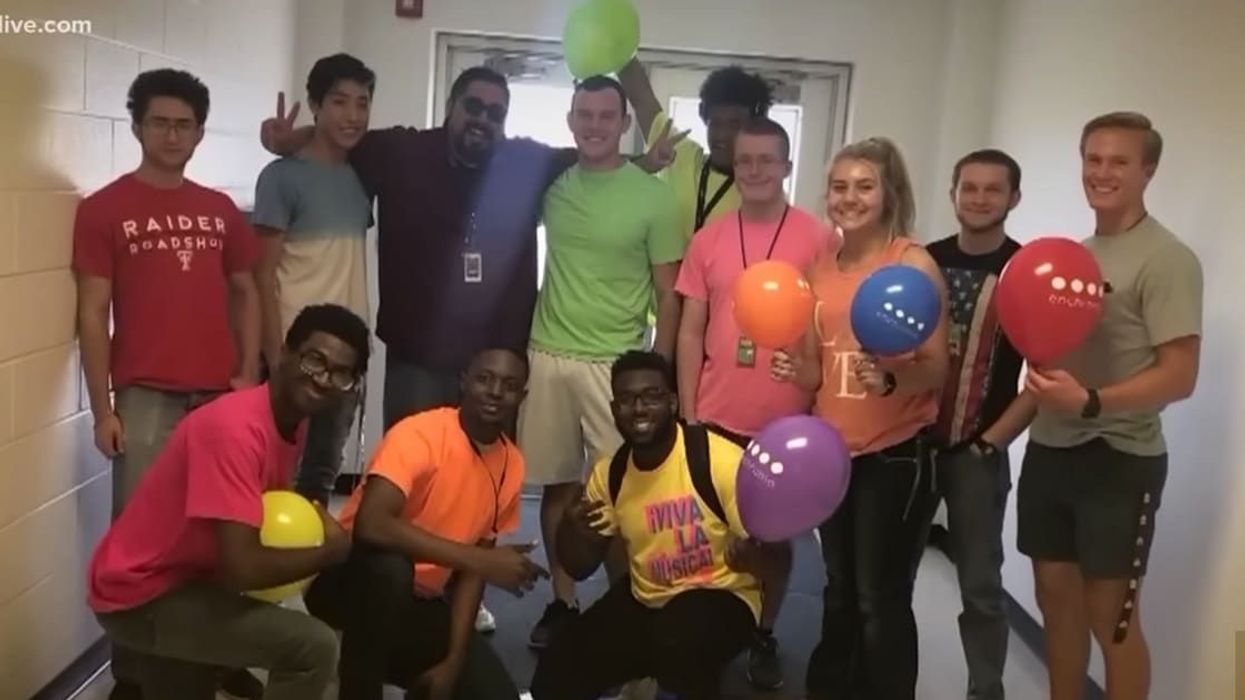A teacher's impact goes far beyond exam scores. They shape the learning experience, connect with students, and nurture their personal growth. At Samuel Clemens High School, students expressed their admiration for their physics teacher with a heartfelt gift, capturing his touching reaction on video.

In a YouTube video shared by 11Alive, physics teacher Roger Alcala receives a priceless gift from his students. Alcala, a beloved science enthusiast, is a favorite among his students. One day, they noticed something about their teacher—he was colorblind. A student recounted the moment, saying, "We have red and green markers, and we were drawing graphs, and he was like, 'With this marker...,' and we were like, 'That one is green, you already used green for the last one.'"
Alcala then confessed his colorblindness to the class, explaining that he couldn't distinguish between red and green hues. He shared, "My eyes and brain can't tell the difference sometimes depending on the hue."

Alcala's students went above and beyond, raising $400 to buy special glasses that would allow him to see colors he never could. As the video shows, they presented him with the gift, forever changing his perspective.
Alcala was stunned and overjoyed when he found the glasses inside the gift box. His reaction after putting them on was priceless. He marveled at the vibrant colors of his students' t-shirts and his daughter's drawing, and the experience brought him to tears. Laughing through his emotions, he said, "Wow! I'm really colorblind," eliciting chuckles from his students.

Alcala was more than pleased with his student's efforts. He explained how the glasses helped him see all the hues, "So, when I put these glasses on, it breaks up the wavelength so I can separate these two colors. And I see them how you see them. And that's the miracle. It happens instantly. It is all physics and science, because I am teaching them the physics, and they're giving it back, making my life better."
The online community was in awe of the heartwarming moment. It garnered over 4 million views on YouTube, with over 100,000 likes. In a majority of comments, people appreciated the students' efforts for their teacher.


One user, @davidt5200, appreciated the teacher, "You know what that means? That means you have impacted their lives and they want to repay it. We need more teachers like you." Another user, @nicolechamberland995, commented, "What a great bunch of kids! They were raised properly."






















 What foods would you pick without diet culture telling you what to do?
What foods would you pick without diet culture telling you what to do?  Flexibility can help you adapt to – and enjoy – different food situations.
Flexibility can help you adapt to – and enjoy – different food situations.
 Anxious young woman in the rain.Photo credit
Anxious young woman in the rain.Photo credit  Woman takes notes.Photo credit
Woman takes notes.Photo credit 
 Revenge can feel easier than forgiveness, which often brings sadness or anxiety.
Revenge can feel easier than forgiveness, which often brings sadness or anxiety. 
 In the past two years, two malaria vaccines have become available for babies starting at 5 months of age.
In the past two years, two malaria vaccines have become available for babies starting at 5 months of age. By exploiting vulnerabilities in the malaria parasite’s defense system, researchers hope to develop a treatment that blocks the parasite from entering cells.
By exploiting vulnerabilities in the malaria parasite’s defense system, researchers hope to develop a treatment that blocks the parasite from entering cells. Created with
Created with